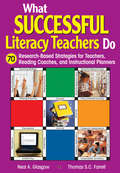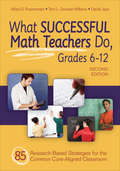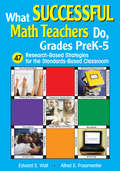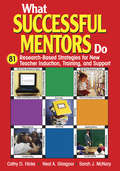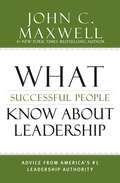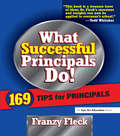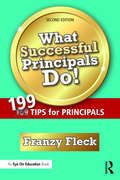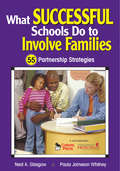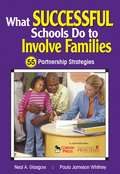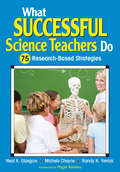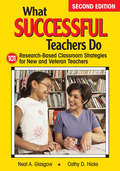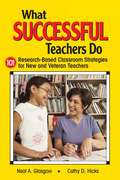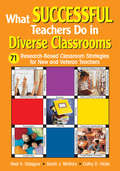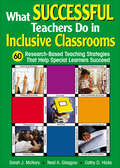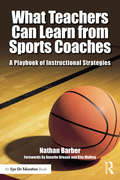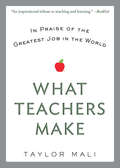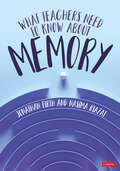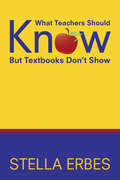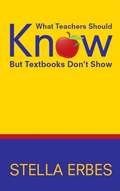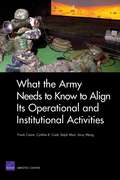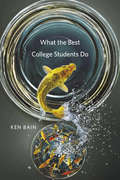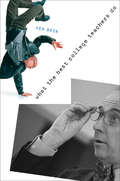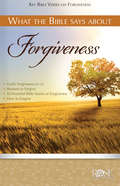- Table View
- List View
What Successful Literacy Teachers Do: 70 Research-Based Strategies for Teachers, Reading Coaches, and Instructional Planners
by Neal A. Glasgow Thomas S. FarrellPresents easy-to-implement literacy strategies covering phonics, phonemics, and decoding; vocabulary, spelling, and word study; fluency, comprehension, and assessment; and technology, special learners, and family literacy.
What Successful Math Teachers Do, Grades 6-12: 80 Research-Based Strategies for the Common Core-Aligned Classroom
by Alfred S. Posamentier Terri L. Germain-Williams Daniel I. JayeThe math teacher's go-to resource—now updated for the Common Core! What works in math and why has never been the issue; the research is all out there. Where teachers struggle is the “how.” That’s the big service What Successful Math Teachers Do provides. It’s a powerful portal to what the best research looks like in practice strategy by strategy—now aligned to both the Common Core and the NCTM Standards. For each of the book’s 80 strategies, the authors present A brief description A summary of supporting research The corresponding NCTM and Common Core Standards Classroom applications Possible pitfalls Recommended reading and research
What Successful Math Teachers Do, Grades PreK-5: 47 Research-Based Strategies for the Standards-Based Classroom
by Edward S. Wall Alfred S. PosamentierThe authors present dynamic learning activities with research-based strategies and sources for further reading to increase students' confidence in math while effectively addressing NCTM standards.
What Successful Mentors Do: 81 Research-Based Strategies for New Teacher Induction, Training, and Support
by Cathy D. Hicks Neal A. Glasgow Sarah J. McnaryBe the best mentor you can be with these state-of-the-art strategies! How can you relate all of your teaching experience to a new teacher? Working from decades of experience, the authors of this guide offer sensible strategies to help mentors help new teachers. The authors synthesize theory and practice to show mentors how to: Increase new-teacher support, success, and retention Guide teachers in their relationships and classroom strategies Improve their own mentoring approach Avoid common mentoring pitfalls
What Successful People Know about Leadership: Advice from America's #1 Leadership Authority (Successful People)
by John C. Maxwell#1 New York Times bestselling author John C. Maxwell responds to the most popular questions he's received to help readers achieve greater success. John Maxwell, America's #1 leadership authority, has mastered the art of asking questions, using them to learn and grow, connect with people, challenge himself, improve his team, and develop better ideas. In this compact derivative of Good Leaders Ask Great Questions, he gives detailed answers to the most popular and intriguing questions posed to him by people at all stages of their careers, including: · How can you be a leader if you're at the bottom? · How do you motivate an unmotivated person? · How can you succeed with a leader who is difficult to work with? · How do you find balance between leading others and producing? · What gives a leader sustainability? No matter whether you're a seasoned leader or wanting to take the first steps into leadership, this book will provide helpful and applicable advice and improve your professional life.
What Successful Principals Do: 169 Tips for Principals
by Franzy FleckHere are practical insights from an experienced principal about how to run a successful school. Organized into three sections (Beginning the School Year, During the School Year, and Ending the School Year) these tips are powerful and attainable. Each one is introduced by an inspiring quote, followed by practical advice on how to implement the strategy. The 169 tips include: Encourage Staff to Set Improvement Goals, Take Staff on Neighborhood Visits, Call Parents with Good News Early, Learn What Parents and Students Want, Give Messages That Students Are Safe, Stress Procedures Early, Be Visible Daily, Keep No Secrets from Your Staff, Don't Make Decisions to Keep Friends, Don't Wait for Group Consensus, Praise Twice, Be a Nurturing Leader, Use Peer Pressure, Let Kids Work It Out, Have Family Night Activities, Admit Mistakes, Learn to Handle Complaints to Your Superiors, Have Written Goals and Update Them Regularly, See the School through the Parent's Eyes, and It Is Better to Do a Few Things Well.
What Successful Principals Do!: 199 Tips for Principals
by Franzy FleckTake charge of your school today with What Successful Principals Do! In this friendly, energetic, and engaging book, Franzy Fleck draws on his experience as a principal to share dozens of practical strategies for running a successful school. Organized into manageable chapters, Fleck’s advice is both powerful and realistic. In this second edition, you’ll find 30 additional tips covering the most timely issues, as well as 13 bonus tips! You’ll learn how to: Effectively use social media Enhance relationships with students, parents, and staff Manage complex decision-making Develop HR and personnel leadership Deal with grief, trauma, and crisis
What Successful Schools Do to Involve Families: 55 Partnership Strategies
by Neal A. Glasgow Paula Jameson WhitneyThis resource offers 55 research-based strategies to help educators bridge the gap between school and home by forming effective partnerships with every type of family group.
What Successful Schools Do to Involve Families: 55 Partnership Strategies
by Paula Whitney Neal GlasgowFrom traditional forms of communication--such as open houses, parent-teacher conferences, and fundraising efforts--to hot-button topics such as bullying and discipline, this book helps educators bridge the gap between school and home.
What Successful Science Teachers Do: 75 Research-Based Strategies
by Neal A. Glasgow Michele C. Cheyne Randy K. YerrickSupercharge your science lessons with proven strategies! The experience and science expertise of these award-winning authors makes this easy-to-use guide a teacher’s treasure trove. Included are 75 research-based strategies, each with a concise description of the supporting research, classroom applications, pitfalls to avoid, and references for additional learning. Teachers of students in Grades K–12 will find novel ways to engage children’s natural curiosity, concern, and creativity. Highlights include how to: Promote collaborative learning Differentiate instruction with culturally responsive practices Build students' scientific literacy and reasoning skills Involve parents in their children's science learning
What Successful Teachers Do: 101 Research-Based Classroom Strategies for New and Veteran Teachers (2nd Edition)
by Neal A. Glasgow Cathy D. HicksProviding classroom applications, precautions, and references, this updated edition translates the latest research into 101 strategies for successful instruction for new and veteran teachers.
What Successful Teachers Do: 101 Research-Based Classroom Strategies for New and Veteran Teachers (1-off Ser.)
by Neal A. Glasgow Cathy D. HicksWritten for novice and seasoned professionals alike, this updated edition of a powerful bestseller provides research-based best practices and practical applications that promote strong instruction and classroom management. The authors translate the latest research into 101 effective strategies for new and veteran K-12 teachers. Updated throughout, and with an entirely new chapter on supporting reading and literacy, this edition presents the strategies in a user-friendly format: The Strategy: a concise statement of an instructional strategy What the Research Says: a brief discussion of the research to provide readers with a deeper understanding of the principles involved Classroom Application: how each strategy can be used in instructional settings Precautions and Possible Pitfalls: caveats to help teachers avoid common problems Sources: a reference list for further reading What Successful Teachers Do is a valuable resource for strengthening teachers' professional development and improving student performance.
What Successful Teachers Do in Diverse Classrooms: 71 Research-Based Classroom Strategies for New and Veteran Teachers
by Neal A. Glasgow Sarah J. Mcnary Cathy D. HicksGrounded in the best peer-reviewed research, each strategy presents guidelines and appropriate precautions to ensure successful transfer to actual classroom practice.
What Successful Teachers Do in Inclusive Classrooms: 60 Research-Based Teaching Strategies That Help Special Learners Succeed
by Sarah J. Mcnary Neal A. Glasgow Cathy D. HicksTest-drive these research-based strategies in your inclusive classroom! Bridging the gap between theory and practice, this book focuses on extending academic research to classroom practices that address the problems faced by teachers working with special needs learners in inclusive classrooms. It outlines a full range of research-based strategies that can be interwoven and tailored to create the best instructional plan for special learners, including: A straightforward one-line action statement An easy-to-read synthesis of relevant studies Specific tactics for immediate application in the classroom Pointers on how to identify and avoid potential pitfalls Sources for further reading on the research/strategy outlined
What Teachers Can Learn From Sports Coaches: A Playbook of Instructional Strategies
by Nathan BarberThe strategies used by winning coaches on the field can bring success to classrooms, too! In What Teachers Can Learn From Sports Coaches, you’ll uncover that the athletic arena and the classroom have more in common than you think. Author Nathan Barber demonstrates how many of the principles of coaching can be used by teachers to motivate students, build community, and enhance teaching. You’ll learn valuable lessons on… Communicating effectively Harnessing the power of teamwork Making work meaningful Embracing technology Building a winning tradition Teaching life lessons Seeking continual improvement And more! The book is filled with insightful quotes from well-known coaches, along with suggestions on how to apply the ideas to your own classroom. You’ll come away with strategies that you can use immediately to bring success to your own team—your students!
What Teachers Make
by Taylor MaliIn praise of the greatest job in the world... The right book at the right time: an impassioned defense of teachers and why we need them now more than ever. Teacher turned teacher's advocate Taylor Mali inspired millions with his original poem "What Teachers Make," a passionate and unforgettable response to a rich man at a dinner party who sneeringly asked him what teachers make. Mali's sharp, funny, perceptive look at life in the classroom pays tribute to the joys of teaching...and explains why teachers are so vital to our society. What Teachers Make is a book that will be treasured and shared by every teacher in America--and everybody who's ever loved or learned from one.
What Teachers Need to Know About Memory
by Jonathan Firth Nasima RiazatApplying the psychology of memory to classroom teaching can enhance learning, reduce workload for teachers and lead to better outcomes for students. Memory is a subject often clouded from understanding by technical jargon and complexities. Busy teachers need support and guidance from experienced authors who are connected to both practice and research. This current, practical guide supports your reflection on and engagement with memory in the classroom, with direct links to your own teaching.
What Teachers Need to Know About Memory
by Jonathan Firth Nasima RiazatApplying the psychology of memory to classroom teaching can enhance learning, reduce workload for teachers and lead to better outcomes for students. Memory is a subject often clouded from understanding by technical jargon and complexities. Busy teachers need support and guidance from experienced authors who are connected to both practice and research. This current, practical guide supports your reflection on and engagement with memory in the classroom, with direct links to your own teaching.
What Teachers Should Know But Textbooks Don't Show
by Stella ErbesThis essential resource helps new teachers survive and thrive in the classroom with proven tips on classroom management, teacher-student relationships, and coping with professional challenges.
What Teachers Should Know But Textbooks Don't Show
by Stella ErbesEven with student teaching experience and education courses under their belts, most new teachers are unprepared for their first year in the classroom. Filled with practical insider information, this resource bridges the gap between instructional theory and practice. This clear, concise, and reader-friendly text combines research, the author's personal experiences, and valuable insights from veteran educators to help new teachers: Create a positive learning environmentAddress classroom management issues while retaining their personal styleConnect with studentsCollaborate with parents and familiesHandle personal and professional challenges This book is ideal for novice and prospective teachers as well as for mentor programs and parenting classes.
What the Army Needs to Know to Align Its Operational and Institutional Activities
by Anny Wong Cynthia R. Cook Frank Camm Ralph MasiThe Army must transform its institutional activities to align them with operating forces to improve support and release resources from institutional activities. This document provides a model for evaluating value chains to promote the alignment of needs and resources according to three representational institutional Army activities: medical services, enlisted accessioning, and short-term acquisition.
What the Best College Students Do
by Ken BainThe author of the best-selling What the Best College Teachers Do is back with humane, doable, and inspiring help for students who want to get the most out of their education. The first thing they should do? Think beyond the transcript. Use these four years to cultivate habits of thought that enable learning, growth, and adaptation throughout life.
What the Best College Teachers Do
by Ken BainWhat makes a great teacher great? Who are the professors that students remember long after graduation? This book, the conclusion of a fifteen-year study of nearly one hundred college teachers in a wide variety of fields and universities, offers valuable answers for all educators. The short answer is-- it's not what teachers do, it's what they understand. Lesson plans and lecture notes matter less than the special way teachers comprehend the subject and value human learning. Whether historians or physicists, in El Paso or St. Paul, the best teachers know their subjects inside and out-- but they also know how to engage and challenge students and to provoke impassioned responses. Most of all, they believe two things fervently: that teaching matters and that students can learn. In stories both humorous and touching, Bain describes examples of ingenuity and compassion, of students' discoveries of new ideas and the depth of their own potential. What the Best College Teachers Do is a treasure trove of insight and inspiration for first-year teachers and seasoned educators.
What the Best Law Teachers Do
by Michael Hunter Schwartz Gerald F. Hess Sophie M. SparrowWhat makes a great law professor? The first study of its kind, What the Best Law Teachers Do identifies the methods, strategies, and personal traits of professors whose students achieve exceptional learning. This pioneering book will be of interest to any instructor seeking concrete, proven techniques for helping students succeed. What the Best Law Teachers Do introduces readers to twenty-six professors from law schools across the United States. These instructors are renowned for their exacting standards: they set expectations high, while also making course requirements--and their belief that their students can meet them--clear from the outset. They demonstrate professional behavior and tell students to approach class as they would their future professional life: by being as prepared, polished, and gracious as possible. And they prepare themselves for class in depth, even when they have taught the course for years. The best law professors understand that the little things matter. They start class on time and stay afterward to answer questions. They learn their students' names and respond promptly to emails. These instructors are all tough--but they are also committed, creative, and compassionate mentors. With its close-to-the-ground accounts of exceptional educators in action, What the Best Law School Teachers Do offers insights into effective pedagogy that transcend the boundaries of legal education.
What the Bible Says About Forgiveness
by Rose PublishingWhat the Bible Says About ForgivenessKey biblical principles about forgiveness. Answers questions including: What is forgiveness? Why do we need forgiveness? Why do we need to forgive others? Why is forgiving enemies tied to whether God will forgive us? 6 Ways to use this Forgiveness ebookFor --* personal use* discipleship* new believer's class* small group study or Sunday school class* divorce, addiction, and abuse recovery groups * "basics of the faith" course.Why buy?* Easy to read. Full-color, packed with fascinating charts and diagrams.*Attractive. Designed for the VISUAL learner.* Fast. This 14-page ebook is perfect for the busy person who doesn't have time to read long books.
